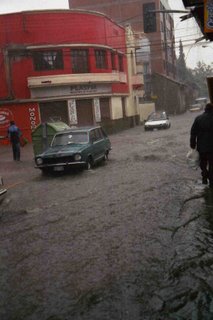Residents of Sucre
After visiting Potosi I went to Sucre http://www.boliviaweb.com/cities/sucre.htm. Sucre is a warmer city since it is only at 2,750 meters (9,022 feet) above sea level and not 4,070 (13,053) as Potosi is. I thought spending about two days there but I stayed four nights. Walking through the cities after busing for hours has become a norm. I walked into hostels to find out prices and availability. This is the way I am travelling after I left Salvador-Brasil on March 9. I still think one day I will be spending the night on a park or something since I don´t reserve any rooms before. Sucre is the city where the Spaniard virreynatos (colonies) started to plan their independence from Spain on the 1,700´s. I visited the Casa Libertad and learned a little bit more about the Pacific war between Bolivia-Peru against Chile. The result, Bolivia loosing its access to the Pacific Ocean in 1879. Something its new president is battling now to get back from Chile. Another interesting site was also the dinosaur treks. You take a bus on the main plaza and ride for twenty minutes until you get to these marks left by those animals some million years ago. I guess I stayed longer because I met some interesting people in the hostel. They are residing in Sucre for some time of their lives. I went with one of them, Katherine, to a girls´orphanage, where she volunteers some days. We helped read and watched the girls practice some music performance they were preparing for the children´s day. One of these girls was picked up from the streets a year ago, she couldn´t even talk. She was six, at least that´s what the ladies who worked there guess. The little girl speaks now and likes to read books, or at least to watch the pictures. She always wanted me to go back to a page where she saw a boy being helped by a doctor. "Doctor, niño, enfermo (sick)" she said. I just wondered how this little girl lived before being in this orphenage. Apparently she is happy to be there and enjoys being with other older girls. The other guys from the hostel are studying Spanish, and they always wanted me to speak in Spanish so they could practice. One of them is practicing Capoeira (Brasilian martial arts/dance), another learning how to play guitar and yet another one is also preparing a documentary about kids who live on the streets of Sucre. I felt like knowing more about these guys´lives but I wanted also to walk around the city and go to different museums and sightseeing spots to check the sunsets. I tend to start very energetic on museums but then, when I have read some of the signs, I get tired and forget what I read at the beginning of my visit. I prefer, then, to walk around and check people doing their daily routines, and seeing old houses. I also saw some "tourists" teaming up with some kids to entertain with acrobatic acts, like playing with three balls, at the stop lights to get some tips from the drivers. This I found of bad taste since the street´s kids did it because it is the only thing they think they can do to get something to eat, the "tourists" who apparently decided to stay in Sucre, since they didn´t look like new arrived tourists, did it, I think (but I could be wrong) to "experience" a new life, to feel different. Perhaps these "foreign acrobats" can help kids like the little girl at the orphanage, to learn a new language, or read or play with them. But we all do what we want with our own time.





